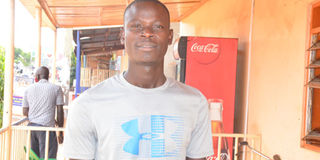Beating Covid: I was nicknamed contact of ‘contactees’

Innocent Atuganyira, a journalist attached to Radio Biiso in Buliisa District and also founder of Buliisa News Room tells his Covid-19 story. PHOTO/FILE/COURTESY
What you need to know:
- Mr Innocent Atuganyira says his experience taught him that the only way to know if you are infected is by being tested for Covid-19.
Greater-Masindi Media Practitioner's Association (GMEPA), an umbrella body that joins journalists in Greater Masindi, including those from Masindi, Kiryandongo and Buliisa districts decided to pick one journalist per media house to attend President Museveni's press conference on December 19, 2020 in Hoima City during presidential campaigns ahead of 2021 polls.
Being the only journalist in Masindi District attached to Radio Biiso in Buliisa District, I was included on the list of media personalities that would only extend coverage upon testing negative for the Coronavirus.
GMEPA president mobilized and we were tested at Masindi General Hospital.
In a space of about two weeks before the results were released, I lost two of my beloved grandmothers in Buliisa District in that my attendance at their burials was inevitable.
When I returned to Masindi after the burials, I received a phone call from one of the medical workers (names withheld) at Masindi General Hospital.
Panic engulfed me after the medic explained to me that he was specifically working on Covid-19 cases.
He asked, “Am I speaking to radio journalist Mr Innocent Atuganyira?
I replied in the affirmative before he further asked-“How are you feeling?”
“I'm okay,” I said.
Have you had any complications in breathing? Do you have headache or flu?”
“I do not have any of those,” I replied.
He then asked for an appointment for us to meet in the evening, however he insisted that we shouldn't meet at my area of residence to avoid suspicion.
We met at the trading centre, and he gave me Vitamin C tablets, Zinc, and painkillers.
He told me to eat plenty of fruits such as pineapples, lemons, avocadoes. More significantly, he advised me to isolate and not move around since I was staying alone.
Surprisingly, when I asked him for my Covid-19 results, he failed to release them. He just told me things would be fine when I received a discharge certificate. Also, my closest friend who went for Covid-19 testing contacted me and said: ‘‘I heard talk at the same health facility of a journalist who had tested positive for coronavirus.’’
No signs or symptoms
It was hard to believe what the medical worker said as I was not showing any signs or symptoms of Covid-19. I thought this was a planned move since they were picking only one journalist per media house.
However I also wondered if they could really do this since I'm the only Masindi journalist attached to Radio Biiso in Buliisa District.
I started to wonder whether the cumulative Covid-19 cases in Uganda that were being spoken about were true since I wasn't availed my results.
I was puzzled and felt strange but I had to gain confidence since I believed that God was in control and I wouldn't die if it wasn't my day.
Later, I started getting phone calls from my colleagues asking about my health.
I’d tell them that I was okay but they insisted saying that I was a Covid-19 victim.
This made me lose trust in medical workers. He had cautioned me not to tell anyone about my health status but I kept receiving phone calls from different people.
I then contacted him and asked whether he was one who disclosed my health status. He apologized and assured me that I’d be given a discharge certificate after 14 days of treatment.
For at least 14 days, I was under quarantine but with no support from government.
My neighbors kept asking why I was not going to work. I told them I was on leave. Since I was told to keep my health status a secret.
I informed my fiancée who works in Buliisa District about my situation since we had met at my grandmother's vigil. I kept urging her to test so she could know her health status. To her, testing was only necessary upon acquiring some signs and symptoms associated with the virus.
However, she supported me all the way and sent financial assistance. Being a health worker, she kept checking on my recovery progress. When 14 days elapsed, I went to Masindi General Hospital and asked for a Covid-19 test but the medical worker told me, “You’re fine,” and instead gave me a discharge note.
This beat my understanding since I was discharged without knowing my health status. In fact, I was given results without being tested after the 14 days.
It didn’t make sense but I took the discharge note with me. For all the 14 days that I had quarantined myself, I did not get any symptom. I kept monitoring myself even two months after but nothing happened.
Nonetheless, I continued eating plenty of fruits as recommended by the health worker.
Stigma
Although I was now free to go to the field, it wasn’t easy. Most of my colleagues avoided me, saying I was a victim.
My discharge certificate was unbelievable to many. Till now, some of them call me contact of ‘contactees’ because I was apparently the first journalist in Greater Masindi to test positive for Covid-19.
Lessons
My experience taught me that you cannot easily tell if are infected with Covid-19 until you get tested.
One can easily die without seeing any signs or feeling sickly.
People should be patient and follow the health worker's instructions to keep safe.
Although I wasn't given results, I obeyed what the health worker told me and I think this saved my life.
However, medics should also be transparent and release results to the victims to avoid suspicion.
*Do you have a Covid19 story to share? Send your story to [email protected]




